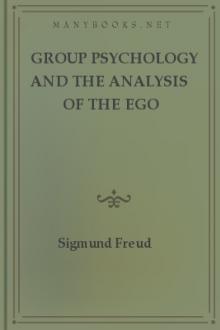Leonardo da Vinci - Sigmund Freud (recommended books to read TXT) 📗

- Author: Sigmund Freud
- Performer: -
Book online «Leonardo da Vinci - Sigmund Freud (recommended books to read TXT) 📗». Author Sigmund Freud
The picture of the cavalry battle of Anghiari, which in competition with Michelangelo he began to paint later on a wall of the Sala de Consiglio in Florence and which he also left in an unfinished state, seemed to have perished through the failure of a similar technical process. It seems here as if a peculiar interest, that of the experimenter, at first reënforced the artistic, only later to damage the art production.
The character of the man Leonardo evinces still some other unusual traits and apparent contradictions. Thus a certain inactivity and indifference seemed very evident in him. At a time when every individual sought to gain the widest latitude for his activity, which could not take place without the development of energetic aggression towards others, he surprised every one through his quiet peacefulness, his shunning of all competition and controversies. He was mild and kind to all, he was said to have rejected a meat diet because he did not consider it just to rob animals of their lives, and one of his special pleasures was to buy caged birds in the market and set them free.[10] He condemned war and bloodshed and designated man not so much as the king of the animal world, but rather as the worst of the wild beasts.[11] But this effeminate delicacy of feeling did not prevent him from accompanying condemned criminals on their way to execution in order to study and sketch in his notebook their features, distorted by fear, nor did it prevent him from inventing the most cruel offensive weapons, and from entering the service of Cesare Borgia as chief military engineer. Often he seemed to be indifferent to good and evil, or he had to be measured with a special standard. He held a high position in Cesare's campaign which gained for this most inconsiderate and most faithless of foes the possession of the Romagna. Not a single line of Leonardo's sketches betrays any criticism or sympathy of the events of those days. The comparison with Goethe during the French campaign cannot here be altogether rejected.
If a biographical effort really endeavors to penetrate the understanding of the psychic life of its hero it must not, as happens in most biographies through discretion or prudery, pass over in silence the sexual activity or the sex peculiarity of the one examined. What we know about it in Leonardo is very little but full of significance. In a period where there was a constant struggle between riotous licentiousness and gloomy asceticism, Leonardo presented an example of cool sexual rejection which one would not expect in an artist and a portrayer of feminine beauty. Solmi[12] cites the following sentence from Leonardo showing his frigidity: "The act of procreation and everything that has any relation to it is so disgusting that human beings would soon die out if it were not a traditional custom and if there were no pretty faces and sensuous dispositions." His posthumous works which not only treat of the greatest scientific problems but also comprise the most guileless objects which to us do not seem worthy of so great a mind (an allegorical natural history, animal fables, witticisms, prophecies),[13] are chaste to a degree—one might say abstinent—that in a work of belle lettres would excite wonder even to-day. They evade everything sexual so thoroughly, as if Eros alone who preserves everything living was no worthy material for the scientific impulse of the investigator.[14] It is known how frequently great artists found pleasure in giving vent to their phantasies in erotic and even grossly obscene representations; in contradistinction to this Leonardo left only some anatomical drawings of the woman's internal genitals, the position of the child in the womb, etc.
It is doubtful whether Leonardo ever embraced a woman in love, nor is it known that he ever entertained an intimate spiritual relation with a woman as in the case of Michelangelo and Vittoria Colonna. While he still lived as an apprentice in the house of his master Verrocchio, he with other young men were accused of forbidden homosexual relations which ended in his acquittal. It seems that he came into this suspicion because he employed as a model a boy of evil repute.[15] When he was a master he surrounded himself with handsome boys and youths whom he took as pupils. The last of these pupils Francesco Melzi, accompanied him to France, remained with him until his death, and was named by him as his heir. Without sharing the certainty of his modern biographers, who naturally reject the possibility of a sexual relation between himself and his pupils as a baseless insult to this great man, it may be thought by far more probable that the affectionate relationships of Leonardo to the young men did not result in sexual activity. Nor should one attribute to him a high measure of sexual activity.
The peculiarity of this emotional and sexual life viewed in connection with Leonardo's double nature as an artist and investigator can be grasped only in one way. Of the biographers to whom psychological viewpoints are often very foreign, only one, Edm. Solmi, has to my knowledge approached the solution of the riddle. But a writer, Dimitri Sergewitsch Merejkowski, who selected Leonardo as the hero of a great historical novel has based his delineation on such an understanding of this unusual man, and if not in dry words he gave unmistakable utterance in plastic expression in the manner of a poet.[16] Solmi judges Leonardo as follows: "But the unrequited desire to understand everything surrounding him, and with cold reflection to discover the deepest secret of everything that is perfect, has condemned Leonardo's works to remain forever unfinished."[17] In an essay of the Conferenze Fiorentine the utterances of Leonardo are cited, which show his confession of faith and furnish the key to his character.
"Nessuna cosa si può amare nè odiare, se prima no si ha cognition di quella."[18]That is: One has no right to love or to hate anything if one has not acquired a thorough knowledge of its nature. And the same is repeated by Leonardo in a passage of the Treaties on the Art of Painting where he seems to defend himself against the accusation of irreligiousness:
"But such censurers might better remain silent. For that action is the manner of showing the workmaster so many wonderful things, and this is the way to love so great a discoverer. For, verily great love springs from great knowledge of the beloved object, and if you little know it you will be able to love it only little or not at all."[19]
The value of these utterances of Leonardo cannot be found in that they impart to us an important psychological fact, for what they maintain is obviously false, and Leonardo must have known this as well as we do. It is not true that people refrain from loving or hating until they have studied and became familiar with the nature of the object to whom they wish to give these affects, on the contrary they love impulsively and are guided by emotional motives which have nothing to do with cognition and whose affects are weakened, if anything, by thought and reflection. Leonardo only could have implied that the love practiced by people is not of the proper and unobjectionable kind, one should so love as to hold back the affect and to subject it to mental elaboration, and only after it has stood the test of the intellect should free play be given to it. And we thereby understand that he wishes to tell us that this was the case with himself and that it would be worth the effort of everybody else to treat love and hatred as he himself does.
And it seems that in his case it was really so. His affects were controlled and subjected to the investigation impulse, he neither loved nor hated, but questioned himself whence does that arise, which he was to love or hate, and what does it signify, and thus he was at first forced to appear indifferent to good and evil, to beauty and ugliness. During this work of investigation love and hatred threw off their designs and uniformly changed into intellectual interest. As a matter of fact Leonardo was not dispassionate, he did not lack the divine spark which is the mediate or immediate motive power—il primo motore—of all human activity. He only transmuted his passion into inquisitiveness. He then applied himself to study with that persistence, steadiness, and profundity which comes from passion, and on the height of the psychic work, after the cognition was won, he allowed the long checked affect to break loose and to flow off freely like a branch of a stream, after it has accomplished its work. At the height of his cognition when he could examine a big part of the whole he was seized with a feeling of pathos, and in ecstatic words he praised the grandeur of that part of creation which he studied, or—in religious cloak—the greatness of the creator. Solmi has correctly divined this process of transformation in Leonardo. According to the quotation of such a passage, in which Leonardo celebrated the higher impulse of nature ("O mirabile necessita ... ") he said: "Tale trasfigurazione della scienza della natura in emozione, quasi direi, religiosa, è uno dei tratti caratteristici de manoscritti vinciani, e si trova cento e cento volte espressa...."[20]
Leonardo was called the Italian Faust on account of his insatiable and indefatigable desire for investigation. But even if we disregard the fact that it is the possible retransformation of the desire for investigation into the joys of life which is presupposed in the Faust tragedy, one might venture to remark that Leonardo's system recalls Spinoza's mode of thinking.
The transformation of psychic motive power into the different forms of activity is perhaps as little convertible without loss, as in the case of physical powers. Leonardo's example teaches how many other things one must follow up in these processes. Not to love before one gains full knowledge of the thing loved presupposes a delay which is harmful. When one finally reaches cognition he neither loves nor hates properly; one remains beyond love and hatred. One has investigated instead of having loved. It is perhaps for this reason that Leonardo's life was so much poorer in love than those of other great men and great artists. The storming passions of the soul-stirring and consuming kind, in which others experience the best part of their lives, seem to have missed him.
There are still other consequences when one follows Leonardo's dictum. Instead of acting and producing one just investigates. He who begins to divine the grandeur of the universe and its needs readily forgets his own insignificant self. When one is struck with admiration and becomes truly humble he easily forgets that he himself is a part of that living force, and that according to the measure of his own personality he has the right to make an





Comments (0)